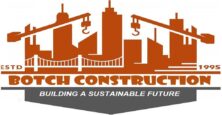ENVIRONMENT
Botch Construction is committed to deploying all the resources needed to preserve the environment and applies very strict rules to all its operations in the North Sea, Africa, Latin America and Asia. This voluntary approach leads us to commit to local territorial planning and sustainable development programmes alongside local communities.
 Reforestation Projects in Latin America
Reforestation Projects in Latin America
As part of our environmental commitment, Botch Construction Colombia has implemented reforestation projects for over 15 years in a bid to protect hydrographic basins. In the Casanare region nearly 100,000 trees have been planted on an area covering more than 98 hectares.
In Guatemala, Botch Construction has created tree nurseries in order to reforest local lands near our operating areas and to maintain the Tikal natural park. Thus, Botch Construction has contributed to more than two million planted trees since 2010.
Converting Offshores Platforms into Artificial Reefs
In Gabon, Botch Construction and the National Parks Agency (ANPN) have signed a Memorandum of Understanding to conduct research work on the protection of marine ecosystems around oil platforms. This protocol is based on results from environmental studies carried out jointly by the ANPN, the National Geographic Society, the Waitt Institute and the Wildlife Conservation Society, which tend to show that offshore platforms – being areas preserved from fishing- constitute an environment conducive of marine biodiversity development.
Agroforestry Project in the DRC
In the DRC, Botch Construction has committed until 2020 to an agroforestry project on a surface of 900 hectares located on the Yema plateau in Muanda territory. More than self-sufficiency, this project aims to teach autonomy to populations through reasoned and sustainable agriculture in terms of fruit and vegetable production while using tree planting to counteract climate change.
Botch Construction has committed to provide plots, cuttings, the assistance of an engineer and equipment, including tractors, but also to drill wells and to install pumps to irrigate crops.
Farmers already cultivate black-eyed peas, fruit trees, avocados and cassava. Acacias are used for heating and coal cooking, making it possible to protect the mangrove while avoiding deforestation. The project has recently been enriched with a beekeeping project and the construction of a honey factory.
These actions complement a prior initiative that had enabled artisanal fishing to be re-launched in Muanda.
